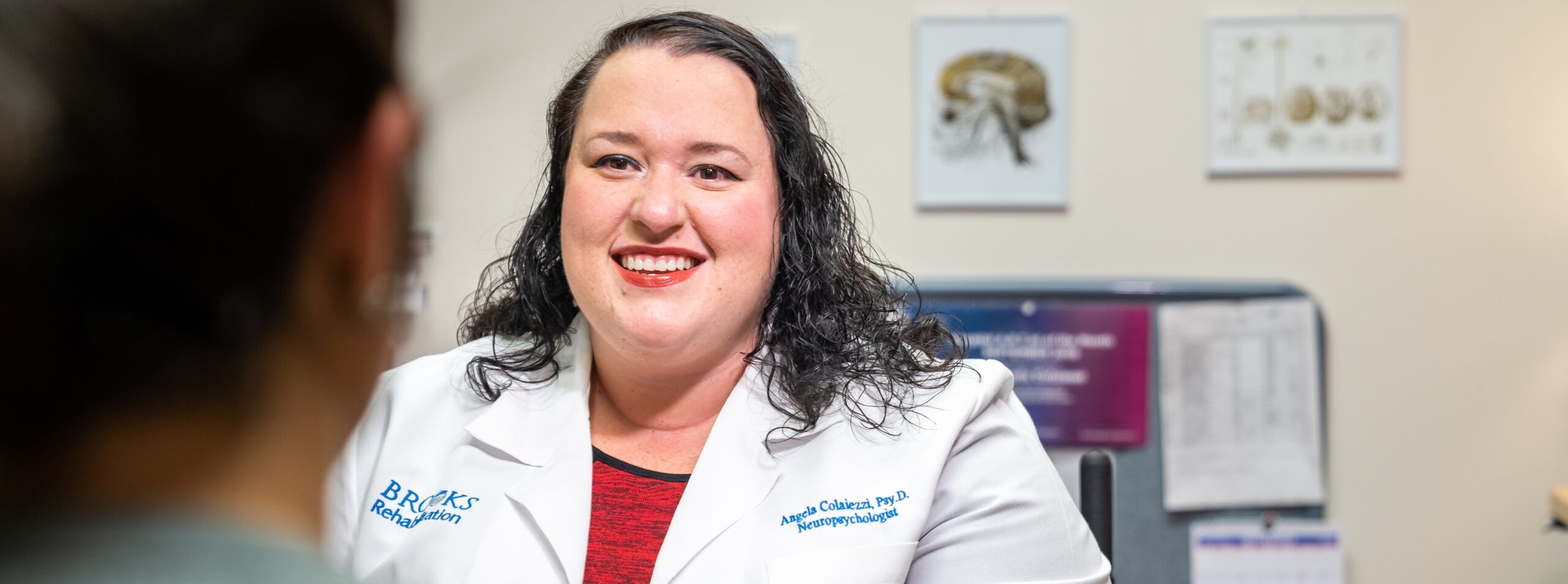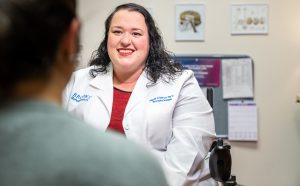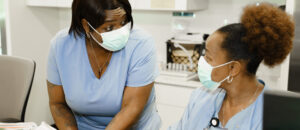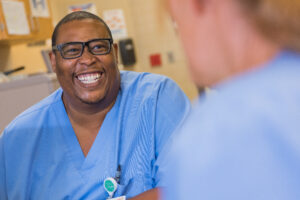A Conversation with Clinical Neuropsychologist, Angela Colaiezzi, PsyD, for Brain Injury Awareness Month

Back to physical health resource hub
March is Brain Injury Awareness Month. At Brooks Rehabilitation, we have extensive experience in treating complex traumatic and non-traumatic brain injuries. Psychological and neuropsychological services are offered in our inpatient hospitals and through our outpatient clinic, Brooks Behavioral Medicine. These services help our patients fully benefit from rehabilitation, recover from illness and injury, and thrive after physical and cognitive changes. Our psychology services work in close collaboration with the other Brooks disciplines. We discussed one of the special psychology areas offered at Brooks – inpatient neuropsychology – with Angela Colaiezzi, PsyD, a clinical neuropsychologist.
Dr. Colaiezzi joined Brooks in 2015. She earned her doctorate in Clinical Psychology (PsyD), with an advanced proficiency certificate in Neuropsychological Assessment, from the American Psychological Association (APA) accredited Immaculata University, in Immaculata, Pennsylvania. She completed her (APA) accredited pre-doctoral internship in Clinical Neuropsychology and Rehabilitation at Mount Sinai Hospital at the Icahn School of Medicine at Mount Sinai in New York City, New York. Dr. Colaiezzi also completed a 2-year post-doctoral Association of Postdoctoral Programs in Clinical Neuropsychology (APPCN) residency fellowship at the Shepherd Center in Atlanta, Georgia.
What is the difference between clinical psychology and neuropsychology?
Clinical psychologists have specialized training to treat individuals with any sort of psychopathology – mental illness diagnosis. Clinical psychologists focus on psychopathology-diagnosis, therapeutic interventions, and assessment of mental health issues – with a strong focus on therapeutically based interventions to assist with a variety of adjustment issues, emotional and psychological problems, as well as crisis intervention.
Clinical neuropsychology is a specialty field within clinical psychology, dedicated to understanding the relationships between brain and behavior, particularly as these relationships can be applied to the diagnosis of brain disorders, assessment of cognitive and behavioral functioning, and the design of effective treatments. A lot of what I do is evaluating the patient’s current cognitive, emotional and behavioral functioning by providing assessments and evaluations to understand what’s really going on. Is this a cognitive issue? Is it a psychological issue? Are we seeing a behavioral issue? We’re the folks who come in and do additional digging and fact finding. It’s like putting a puzzle together, so to speak, to be able to help assist the team with that particular patient.
What’s special about practicing neuropsychology at Brooks?
What I love about Brooks is that I’ve been able to tap into a variety of different experiences from my training. It’s a very rare experience to go from assessing someone who’s in a disordered state of consciousness (a specialized program at Brooks for those who’ve experienced a severe brain injury) to assessing higher functioning patients who are being admitted under our worker’s compensation program, who may have sustained a concussion while at work. It really allows us to showcase a wide breadth of our clinical abilities.
As a neuropsychologist, we can provide comprehensive neuropsychological assessments to determine diagnosis, identify strengths and areas for improvement and provide targeted recommendations for treatment and potential accommodations moving forward. Another one of my specialties is behavior management. After a brain injury, individuals may experience restlessness, irritability, noncompliance, dysregulation and agitation. I work to identify potential triggers for various behaviors and what could be intentionally or unintentionally reinforcing those behaviors. I provide the therapy and nursing team individualized and targeted strategies on how best to work with patients as they move through this phase in order to maximize their participation.
We have such a great team at Brooks. Each person on the rehabilitation team is an integral part of the overall picture for each patient. We rely heavily on our therapists and our nursing staff to tell us what they are seeing in their interactions with patients through their daily care and therapies – they’re the “eyes and ears” of what’s going on, and can help by telling us what is or is not working: psychologically, behaviorally, or cognitively, in getting the best recovery for patients. Additionally, our physician partners truly value our input on our patient interventions and assessments, what we’re seeing in our sessions, our unique skillset and what that can bring to patients recoveries and our value in helping each patient achieve their best. Everyone on the team moves together, in a forward momentum, working to get the best outcomes for each patient. So, how it all comes together is like a beautiful symphony, really.
Can you elaborate on the “Disorders of Consciousness” program?
Brooks Rehabilitation’s Disorders of Consciousness Program is for those patients who have experienced a severe brain injury, either acquired or traumatic, and they’re now presenting in either an unresponsive wakefulness state or a minimally conscious state. Assessment of this population requires additional specialized training to be able to evaluate and accurately diagnosis and treat these patients and to implement recommendations. Those may include training and educating their family, providing support as their family begin to process the emotions surrounding their loved one’s injury, and do everything possible to provide the best possible environment for the patient to emerge from the disordered state, if they are able to. That may, or may not happen while they are here at our rehab hospital. In fact, it may happen much later. We successfully give them all of the tools to be able to continue to assess their loved ones responses to the environment around them and to provide the best possible care for their loved ones after they go home. If and when they are able to emerge, many times patients and their families come back to participate in our full inpatient rehabilitation program.
We, at Brooks, are truly honored to be able to provide this specialized program and we feel privileged to be able to work with patients and their families through this stage of their recovery.
Given that it’s Brain Injury Awareness Month, what do you say to someone about brain injuries and psychology in general? For example, when would be a good idea to perhaps they would need to talk to a counselor?
For each room in our inpatient rehabilitation hospitals, it’s important to remember that, in the blink of an eye- everything changed for that patient and their family. Brain injuries are especially challenging for individuals as the injury can affect every aspect of an individual’s functioning: their physical, cognitive, and emotional/ behavioral functioning, occupations, family dynamics, social interactions and more. It is truly a complex injury. Add to the fact that no brain injury is the same, and one can see why survivors and their families can have many questions about the overall effects of brain injury, their recovery options and future prognostic overviews. After a brain injury, it’s important to connect with a facility which offers a wide diversity of services that can individualize your care to your specific needs and implement treatment plans that maximize your recovery.
At Brooks, we have more than 50 years of extensive experience in providing complex neurorehabilitation for both traumatic and non-traumatic brain injuries. Once you are in the Brooks system, you are in the Brooks family throughout your recovery! Brooks offers a true continuum of care, and our psychology and neuropsychology services are right there with you through the journey, from inpatient hospitalization, all the way through to our outpatient services, such as our specialized Brain Injury Day treatment program, outpatient psychological services, and comprehensive neuropsychological assessments for evaluating return to school or work abilities.
When speaking with individuals outside of Brooks, I always try to provide psychoeducation on the importance of prevention. Take care of your health, practice meticulous self-care, and always remember to keep prevention of brain injuries in mind. That means, watching out for fall-risks at home; provide safety measures to protect kids from falls or injuries; wear your seatbelts while in vehicles; no texting and driving; never drive after consuming alcohol of any amount; stay away from drug abuse; and always wear your helmets while biking, skiing, skateboarding, hoverboarding, or playing contact sports. You only get one brain!
With regards to mental health, I think the general public is catching on to the importance of mental health. It is truly as important as our physical health. We should all be living happy and productive lives, and if for some reason we’re not feeling that way, then it’s important to figure out why that is. I appreciate folks who talk about their mental health issues openly. It normalizes the experience as opposed to hiding it. It also allows those around you, your friends and your family, to be able to recognize, “Oh, they might be going through a struggle. How can I help?”
I think it’s also important to make sure that you’re recognizing the subtle signs of having difficulties with your emotions, whether you’re seeing fluctuations in your mood or you’re not wanting to spend as much time around those that matter to you. Maybe you’re noticing increased difficulties with sleeping too much, or not enough, or not eating as much or too much due to your mood; or you are feeling sad or hopeless. It’s important to reach out and let someone know that you’re feeling this way and talk to providers who can assist you with that process through trained psychologists and neuropsychologists who can help.
Learn more:
Neuropsychology Services at Brooks


